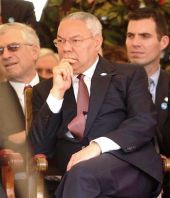Powell lauds Sudan peace pact, warns US policy linked to Darfur
NAIROBI, Jan 9 (AFP) — US Secretary of State Colin Powell applauded a historic peace pact between Sudan and southern rebels but warned that US policy toward the country would be tied to a resolution of the crisis in Darfur.

|
|
U.S. Secretary of State Colin Powell, at Nairobi’s Nyayo Stadium, Sunday, Jan. 9, 2005 to witness the Sudan Comprehensive Peace Agreement. US ambassador at the UN John Danforth on his right. (AP). |
Powell, here for the signing of the accord between Khartoum and the Sudan People’s Liberation Movement/Army (SPLM/A), said the sides must “immediately” move toward a political solution in Darfur or miss out on potential benefits from Washington.
“These new ‘partners for peace’ must work together immediately to end the violence and atrocities that continue to occur in Darfur,” he said. “Not next month on in the interim period, but right away, starting today.
“The United States and the world community expect the new partners to use all necessary means to stop the violence and we expect to see rapid negotiation in the crisis in Darfur,” Powell said.
“For our part, the United States looks forward to a positive relationship with this new Sudan,” he said. “However, achieving a positive relationship will only be possible in the context of peace throughout the entire country.”
The United States has long been pushing for an end to the north-south conflict that began early in 1983, and launched a major campaign two years ago to support regional mediation efforts.
As part of that effort, Washington has held out the promise of better ties with the Muslim government in Khartoum which the State Department lists as a “state sponsor of terrorism” and is subject to numerous US sanctions.
Such steps, however, were complicated by lengthy delays in the north-south negotiations and, more importantly, by the worsening situation in Darfur which deteriorated significantly in the spring of 2004.
Sudanese troops and their militia allies have been fighting since February 2003 against rebel groups in Darfur, who have been demanding a greater share of oil revenues for development.
In September, Powell said the violence in Darfur, which has claimed some 70,000 lives and left 1.6 million people homeless, constituted “genocide” and roundly blasted the Sudanese government for its role in the western region.
On Saturday, Powell sidestepped a question whether he thought genocide was still occurring in Darfur but noted that the possibility still exists for UN sanctions to be imposed on Khartoum.
